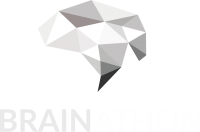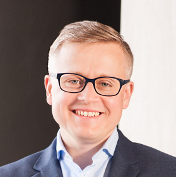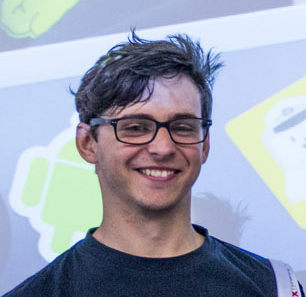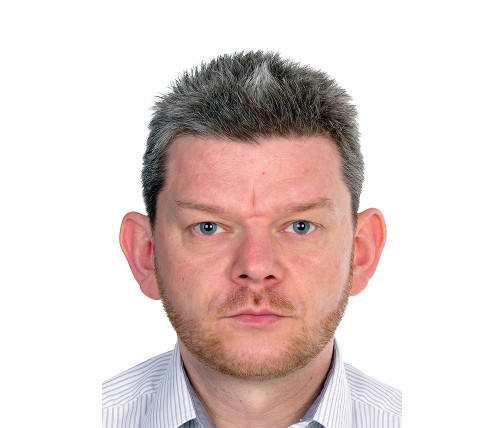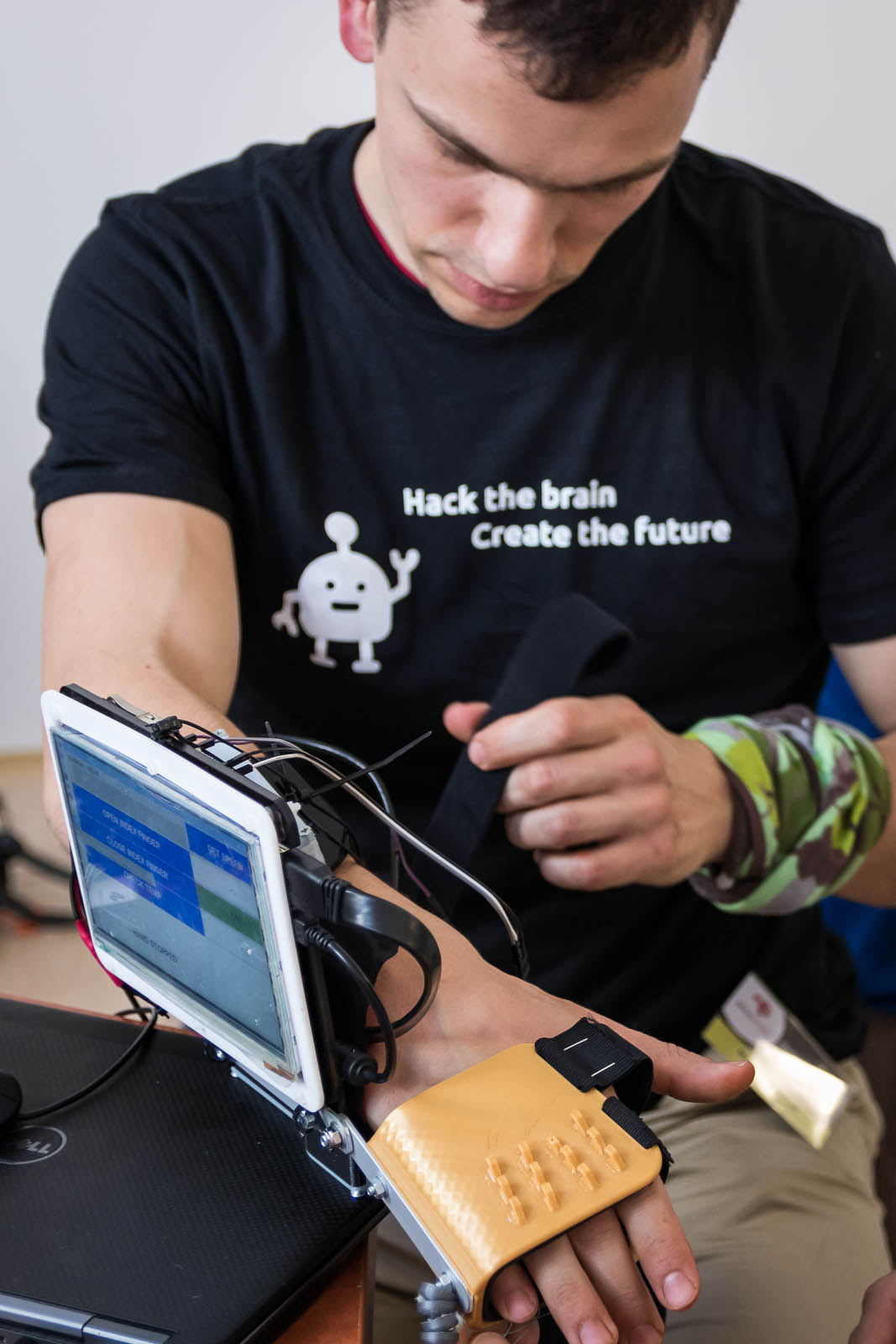

Brainathon is a Brain-Computer Interface Hackathon that brings together developers, technologists, engineers, students, artists, and scientists in teams of 5 participants. The teams have over 24 hours to cram and build solutions that they can present. Brainathon provides an environment for innovation and entrepreneurship. By putting creative minds from multiple disciplines together for a short period of time, we have the opportunity to discover and uncover possibilities for using BCI-related hardware and software not readily thought of. Hacks and innovation developed from the Brainathon have great potential for commercialization and are designed to be a learning experience for everyone.
There are several predefined projects at the Brainathon, which the participants can choose to work on. Below, the projects are described in detail including hard- and software specifications as well as the number of possible participants for each project. Motor imagery and EP based systems are mostly used to control the applications. Specific hardware for the projects will be provided, however, software should already be installed on your personal laptop before you come to the hackathon.
- Application deadline is 10th April, 2018. After this date no further entries to the event will be permitted.
- The participation in the event is free of charge. The participants are responsible for covering the travel and subsistence expenses on their own, including any necessary travel documents, passports and visas.
- The event is organized for 35 hackers. In case of more than 35 applications, the organizers will decide individually based on the CV provided by the applicants.
- The language of the event is English; all entries and final presentations must be prepared and presented in English language.
- The organizers reserve the right to change the number of hacking groups in case the minimum number of participants of the hacking project is not reached.
In case of any questions/doubts, please contact: brainathon@neurodevice.pl
Who can participate?
Anyone can participate who has interests in BMI, BCI, robotics, AR, VR, machine learning, computing, sensors, human-machine interface systems, control, signal processing, big data, haptics, rehabilitation, and similar areas. One does not have to be a BMI expert to participate on a team! Interdisciplinary teams with a combination of BMI and non-BMI skills are often successful in building solutions and producing working prototypes.
What's in there for me?
Be creative, think outside the box. The Brainathon is fun and gets you to network and collaborate with other Geeks. Of course, there will be prizes for the best projects:
- Brainathon Winner Prizes: 7,000 PLN + 8,000 PLN
- IEEE Brain Prize: $ 600 travel budget + 1 free registration and acceptance to present hackathon results during the poster session at the IEEE Brain Initiative Workshop on Advanced NeuroTechnologies on November 1-2, 2018 in San Diego, USA
HACKATHON SCHEDULE
Saturday, 2018/4/21
| 10:00 – 10:30 AM |
Welcome |
| 10:30 – 11:15 AM |
Principles of neurorestauration: |
| 11:15 AM – 12:00 PM |
FutureLab as an accelerator of advanced |
| 12:00 – 1:00 PM | Hacker groups and mentoring |
| 1:00 PM | START: BRAINATHON |
Sunday, 2018/4/22
| 1:00 PM | END: BRAINATHON |
| 1:00 – 1:30 PM | Preparation of presentations |
| 1:30 – 3:00 PM | Hackathon project presentations |
| 3:00 – 4:00 PM | Meeting Hackathon Jury |
| 3:00 – 4:00 PM | How BCI improves rehabilitation of coma patients Krzysztof Malej, Neuro Device |
| 4:00 – 4:30 PM | Ceremony |
HACKING PROJECTS
intendiX/extendiX Smart Home
The unicorn is supported by the P300 based spelling application intendiX. It is possible to control home devices such as lamps, radios or television. Watch the intendiX/extendiX Smart Home video.
soft-/hardware specifications: unicorn, everyday objects (bring your own objects)
participants: 1 group, 3-5 people per group
skills: Basic programming skills (Matlab, Simulink)
Orthosis Control
It is possible to control a 3D printed orthosis using a unicorn amplifier with motor imagery. It is possible to move an orthosis by thinking about left or right hand motion. Watch the Orthosis Control video.
soft-/hardware specifications: g.USBamp, orthesis
participants: 1 group, 3-5 people per group
Skills: Basic programming skills (Matlab, Simulink)
Unity Games
It is possible to control a unity based games.
soft-/hardware specifications: g.Nautilus
participants: 1 group, 3-5 people per group
Skills: Basic programming skills (Matlab, Simulink), Basic graphics programming with Unity
Sphero SPRK Control
The unicorn is supported by the P300 based spelling application intendiX. It is possible to controll a robotic ball called Sphero with intendiX. Watch the Sphero Control video.
soft-/hardware specifications: unicorn, Sphero
participants: 1 group, 3-5 people per group
skills: Basic programming skills (C#)
FES Control
It is possible to control a FES using a unicorn amplifier with motor imagery. It is possible to move a FES by thinking about left or right hand motion.
soft-/hardware specifications: unicorn, FES
participants: 1 group, 3-5 people per group
skills: Basic programming skills (Matlab, Simulink)
e-puck Control
It is possible to control an e-puck with the P300 based spelling application intendiX. Watch the e-puck control video.
soft-/hardware specifications: g.Nautilus, e-puck
participants: 1 group, 3-5 people per group
skills: Basic programming skills (C#)
ARTISTIC PROJECTS
intendiX Painting
Create images according to your EEG signals.
soft-/hardware specifications: unicorn
participants: 1 group, 3-5 people per group
THAT WAS POZNAN 2018. THANK YOU!
BRAINATHON WINNER
Team "Sphero Control"
The team realized Sphero control via a P300 matrix and mounted a camera on top of the robot to observe the environment. The video from the camera is transmitted to a smart phone.
Team members: Max Adamski, Tomasz Sluszniak, Johannes Anand, Bartlomiej Lubiatowski, Adrian Dusinski
BRAINATHON WINNER
Team "Unity Games"
The team realized a Unity game that is controlled with a P300 BCI system and a hand-held controller by two players.
Team members: Adam Gotlib, Daniel Sierpinski, Grzegorz Potrykus, Rajiv Kumar Jha, Christoph Gkoumas
IEEE BRAIN
WINNER
Team "FES Control"
The team used a motor imagery based BCI to control a FES device. The major improvement was the optimized training with images of certain movements (like an image of a hammer).
Team members: Agnieszka Wierzbicka, Sebastian Kopacz, Lukasz Madry, Justyna Gula, Alicja Krzesniak
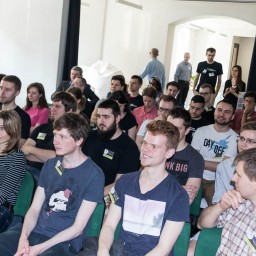 BR41N.IO%20Poznan%202018-32
BR41N.IO%20Poznan%202018-32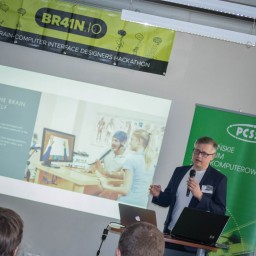 BR41N.IO%20Poznan%202018-36
BR41N.IO%20Poznan%202018-36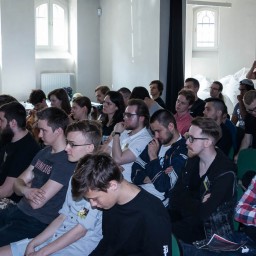 BR41N.IO%20Poznan%202018-38
BR41N.IO%20Poznan%202018-38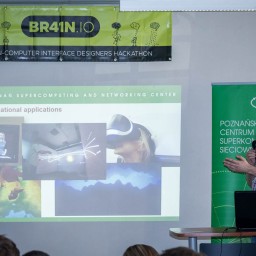 BR41N.IO%20Poznan%202018-43
BR41N.IO%20Poznan%202018-43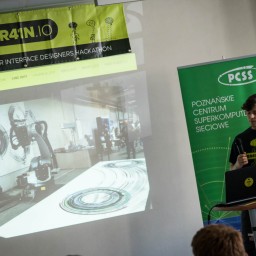 BR41N.IO%20Poznan%202018-51
BR41N.IO%20Poznan%202018-51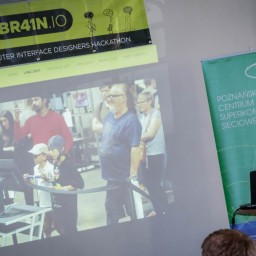 BR41N.IO%20Poznan%202018-53
BR41N.IO%20Poznan%202018-53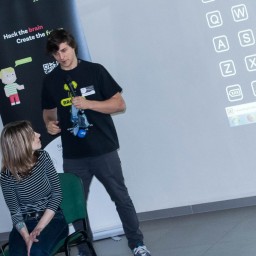 BR41N.IO%20Poznan%202018-60
BR41N.IO%20Poznan%202018-60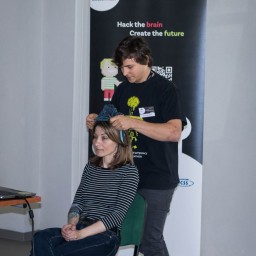 BR41N.IO%20Poznan%202018-63
BR41N.IO%20Poznan%202018-63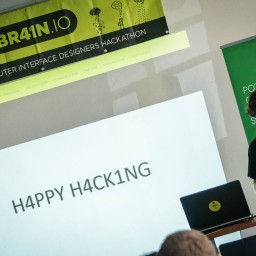 BR41N.IO%20Poznan%202018-81
BR41N.IO%20Poznan%202018-81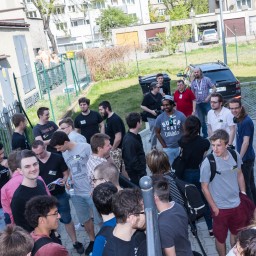 BR41N.IO%20Poznan%202018-85
BR41N.IO%20Poznan%202018-85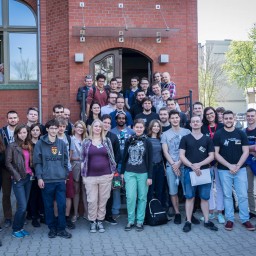 BR41N.IO%20Poznan%202018-86
BR41N.IO%20Poznan%202018-86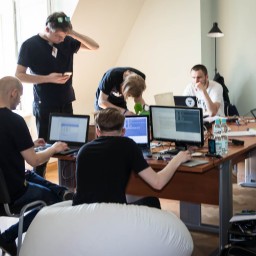 BR41N.IO%20Poznan%202018-88
BR41N.IO%20Poznan%202018-88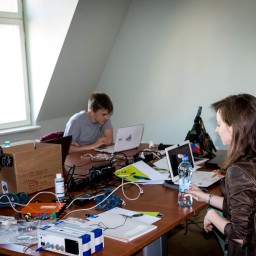
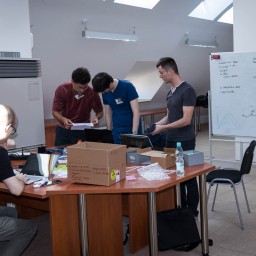
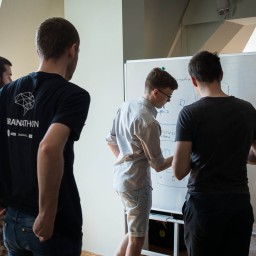
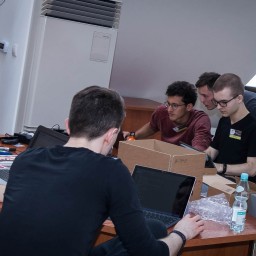 BR41N.IO%20Poznan%202018-96
BR41N.IO%20Poznan%202018-96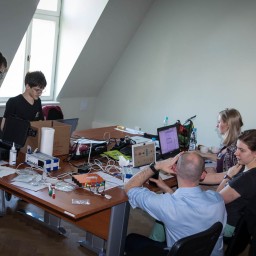 BR41N.IO%20Poznan%202018-101
BR41N.IO%20Poznan%202018-101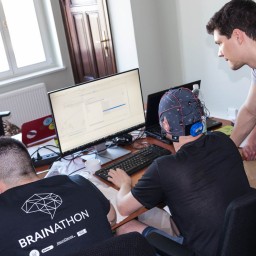 BR41N.IO%20Poznan%202018-103
BR41N.IO%20Poznan%202018-103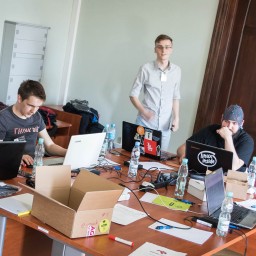 BR41N.IO%20Poznan%202018-106
BR41N.IO%20Poznan%202018-106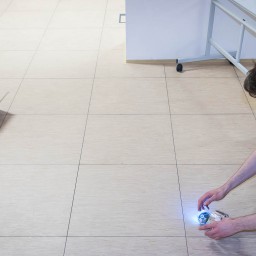 BR41N.IO%20Poznan%202018-122
BR41N.IO%20Poznan%202018-122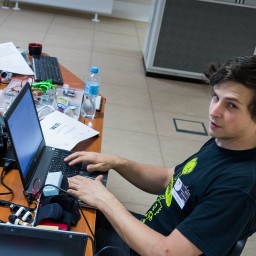 BR41N.IO%20Poznan%202018-123
BR41N.IO%20Poznan%202018-123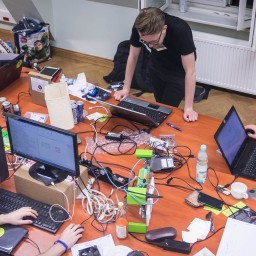 BR41N.IO%20Poznan%202018-125
BR41N.IO%20Poznan%202018-125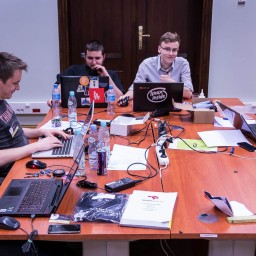 BR41N.IO%20Poznan%202018-126
BR41N.IO%20Poznan%202018-126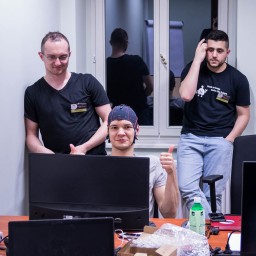 BR41N.IO%20Poznan%202018-127
BR41N.IO%20Poznan%202018-127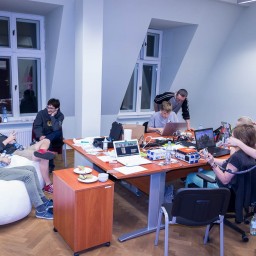 BR41N.IO%20Poznan%202018-128
BR41N.IO%20Poznan%202018-128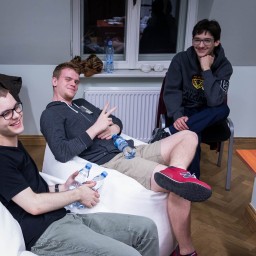 BR41N.IO%20Poznan%202018-129
BR41N.IO%20Poznan%202018-129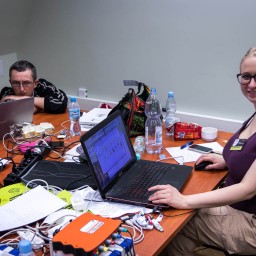 BR41N.IO%20Poznan%202018-131
BR41N.IO%20Poznan%202018-131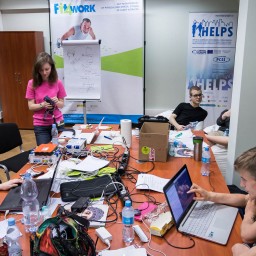 BR41N.IO%20Poznan%202018-133
BR41N.IO%20Poznan%202018-133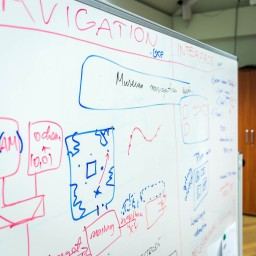 BR41N.IO%20Poznan%202018-136
BR41N.IO%20Poznan%202018-136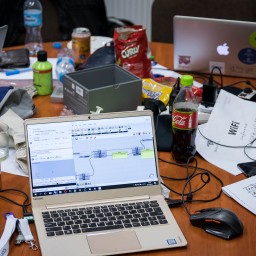 BR41N.IO%20Poznan%202018-140
BR41N.IO%20Poznan%202018-140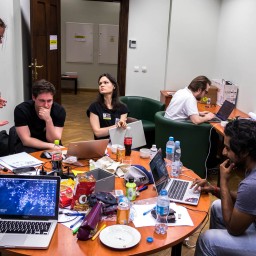 BR41N.IO%20Poznan%202018-142
BR41N.IO%20Poznan%202018-142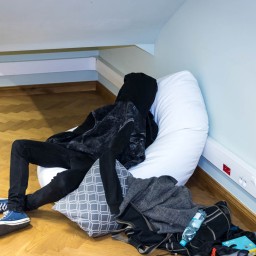 BR41N.IO%20Poznan%202018-159
BR41N.IO%20Poznan%202018-159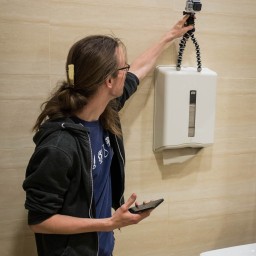 BR41N.IO%20Poznan%202018-173
BR41N.IO%20Poznan%202018-173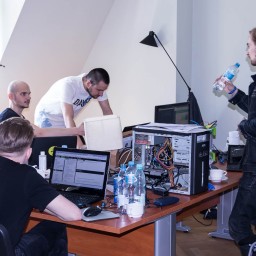 BR41N.IO%20Poznan%202018-184
BR41N.IO%20Poznan%202018-184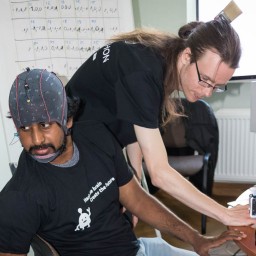 BR41N.IO%20Poznan%202018-188
BR41N.IO%20Poznan%202018-188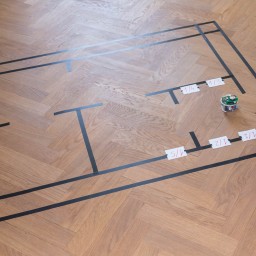 BR41N.IO%20Poznan%202018-191
BR41N.IO%20Poznan%202018-191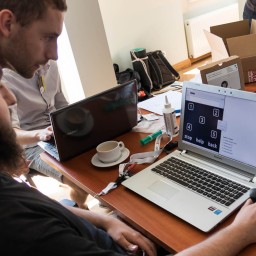 BR41N.IO%20Poznan%202018-194
BR41N.IO%20Poznan%202018-194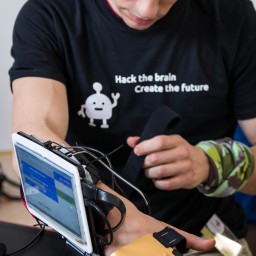 BR41N.IO%20Poznan%202018-198
BR41N.IO%20Poznan%202018-198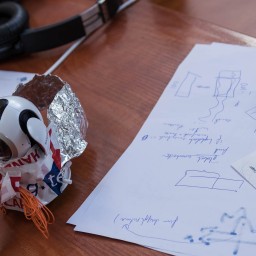 BR41N.IO%20Poznan%202018-200
BR41N.IO%20Poznan%202018-200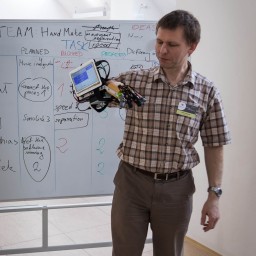 BR41N.IO%20Poznan%202018-202
BR41N.IO%20Poznan%202018-202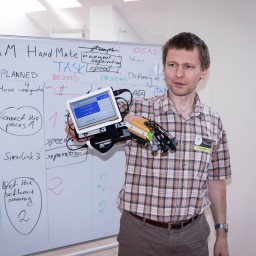 BR41N.IO%20Poznan%202018-203
BR41N.IO%20Poznan%202018-203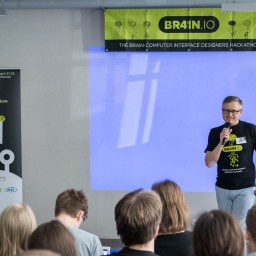 BR41N.IO%20Poznan%202018-205
BR41N.IO%20Poznan%202018-205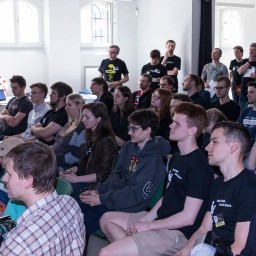 BR41N.IO%20Poznan%202018-207
BR41N.IO%20Poznan%202018-207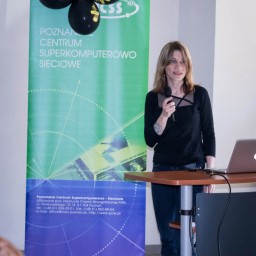 BR41N.IO%20Poznan%202018-211
BR41N.IO%20Poznan%202018-211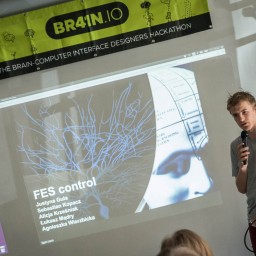 BR41N.IO%20Poznan%202018-224
BR41N.IO%20Poznan%202018-224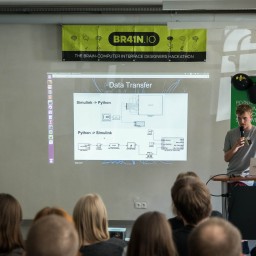 BR41N.IO%20Poznan%202018-229
BR41N.IO%20Poznan%202018-229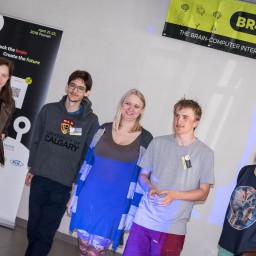 BR41N.IO%20Poznan%202018-232
BR41N.IO%20Poznan%202018-232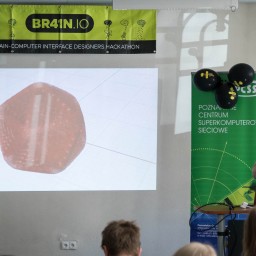 BR41N.IO%20Poznan%202018-236
BR41N.IO%20Poznan%202018-236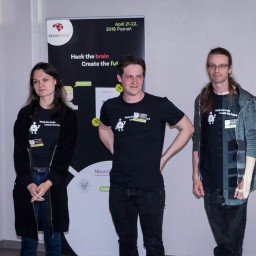 BR41N.IO%20Poznan%202018-237
BR41N.IO%20Poznan%202018-237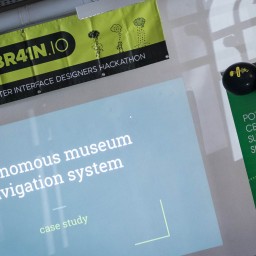 BR41N.IO%20Poznan%202018-239
BR41N.IO%20Poznan%202018-239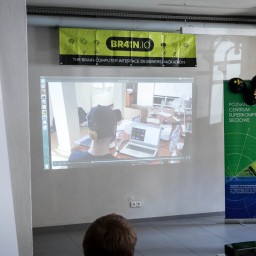 BR41N.IO%20Poznan%202018-245
BR41N.IO%20Poznan%202018-245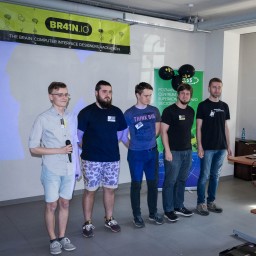 BR41N.IO%20Poznan%202018-246
BR41N.IO%20Poznan%202018-246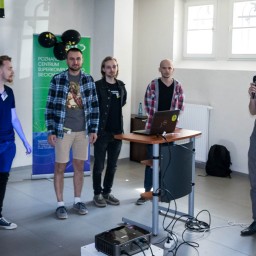 BR41N.IO%20Poznan%202018-250
BR41N.IO%20Poznan%202018-250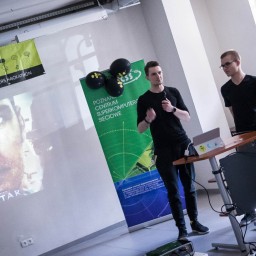 BR41N.IO%20Poznan%202018-253
BR41N.IO%20Poznan%202018-253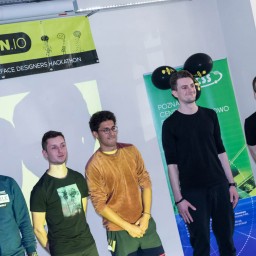 BR41N.IO%20Poznan%202018-265
BR41N.IO%20Poznan%202018-265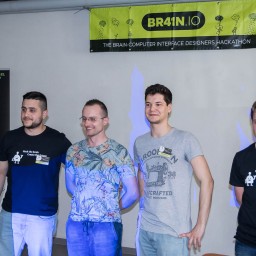 BR41N.IO%20Poznan%202018-275
BR41N.IO%20Poznan%202018-275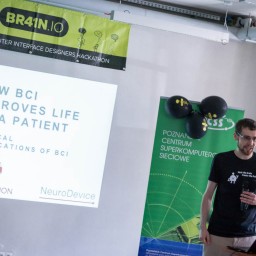 BR41N.IO%20Poznan%202018-276
BR41N.IO%20Poznan%202018-276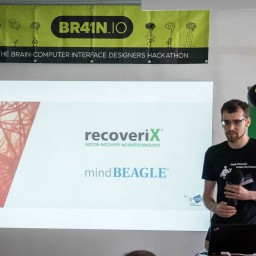 BR41N.IO%20Poznan%202018-278
BR41N.IO%20Poznan%202018-278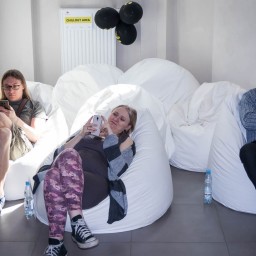 BR41N.IO%20Poznan%202018-280
BR41N.IO%20Poznan%202018-280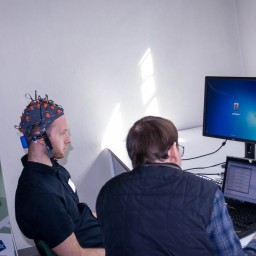 BR41N.IO%20Poznan%202018-282
BR41N.IO%20Poznan%202018-282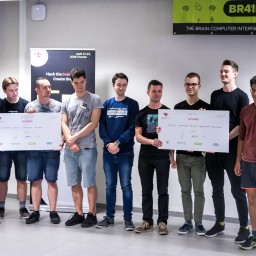 BR41N.IO%20Poznan%202018-306
BR41N.IO%20Poznan%202018-306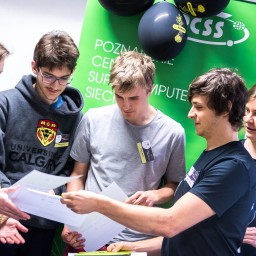 BR41N.IO%20Poznan%202018-316
BR41N.IO%20Poznan%202018-316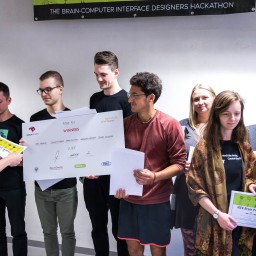 BR41N.IO%20Poznan%202018-321
BR41N.IO%20Poznan%202018-321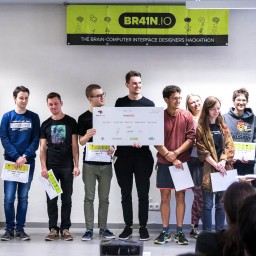 BR41N.IO%20Poznan%202018-323
BR41N.IO%20Poznan%202018-323
